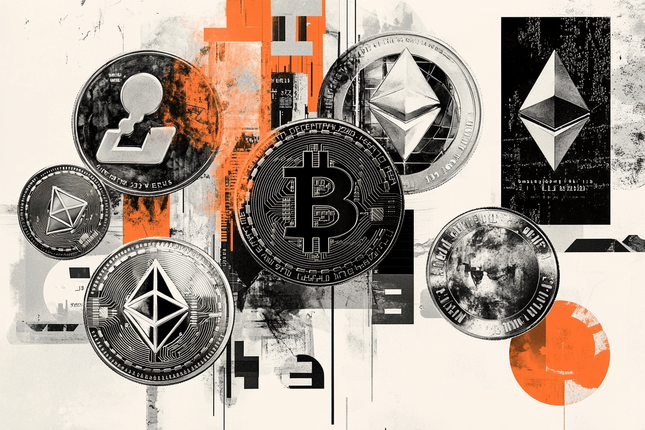AI has already made a profound impact on the financial markets. Its ability to predict trends, execute trades swiftly, and manage risk is transforming investment strategies at its core. Since it allows companies to provide enhanced user experience with improved accuracy and personalisation, businesses have started to adopt the tech and implement AI-based solutions. NVIDIA's 2024 survey revealed that over 60% of financial services firms have already integrated AI into their processes, while another 25% are actively planning to do so. These companies use AI to improve decision-making, streamline operations, and enhance risk management. According to BCG, AI has the potential to increase financial services productivity by as much as 40% by 2025. In this article, we'll explore how AI changes the investment landscape and highlight practical examples of its application in the financial sector.
The role of AI in financial markets
The financial sector's integration of AI isn't just about data processing or speed; it's a multi-dimensional transformation. According to NVIDIA, AI in finance is now used for fraud detection, predictive analysis, and even customer service. AI's ability to sift through massive data sets, identify hidden patterns, and make accurate predictions is unparalleled. Whether it's historical market data, social media sentiment, or financial reports, AI systems are increasingly relied upon to forecast market movements, which facilitates trading. For instance, with AI-based tools like OctaVision, which provides AI-driven analysis, traders can quickly, easily, and more accurately assess market data and identify potential opportunities. Kar Yong Ang, a financial market analyst at Octa, a globally recognised licensed broker, remarks: ‘AI's growing role in trading and investment isn't just about speed or data processing. Its real value lies in its ability to offer retail traders access to sophisticated analytical tools, empowering them to make more informed, data-driven decisions’.
Besides these AI-driven benefits, the tech allows for new user experiences, such as:
Algorithmic trading: AI-powered trading platforms can now execute trades at speeds impossible for humans to match. According to IBM's report, around 80% of financial firms leverage AI for real-time market analysis and trade execution. This has contributed to the growth of high-frequency trading (HFT), which allows thousands of trades to be made in microseconds.
Portfolio management: AI also plays a critical role in portfolio diversification. By assessing economic trends, geopolitical risks, and historical data, AI helps create more balanced portfolios. Forbes highlights that AI-powered portfolio management can reduce risk exposure by up to 25%, an advantage in volatile markets.
Real-life examples of AI in finance
Several top financial institutions demonstrate how AI is changing the landscape. Renaissance Technologies, for instance, has leveraged AI-driven models for decades to power its Medallion Fund. This fund, often described as one of the most successful in history, employs machine learning to identify trading patterns that are otherwise invisible to human traders. Over the past few decades, the fund's AI-driven approach has helped generate annualised returns exceeding 66%, a feat nearly unmatched in the industry.
Similarly, BlackRock, the world's largest asset manager, utilises AI-driven tools to track market trends and improve its investment strategies. Their partnership with Microsoft and NVIDIA underscores the importance of building robust AI infrastructures to stay competitive in global markets.
The opportunities and risks of AI in trading
While the benefits of AI in trading are compelling, it's essential to acknowledge the risks. According to the State of AI in Financial Services: 2024 Trends report, one of the major challenges for businesses is preserving data privacy and building secure AI: 84% of financial organisations have already implemented or plan to implement a framework to govern how AI will be built, trained, and used to adhere to business principles and relevant regulation.
For traders and investors, a key concern is over-reliance on algorithms. They might become too dependent on AI systems, leading to a disconnect from market fundamentals. In extreme cases, this could result in flash crashes, where AI systems react too quickly to market anomalies, causing extreme volatility in short periods.
Furthermore, AI models are only as good as the data they're trained on. Poor data quality can lead to inaccurate predictions, which, in turn, may cause significant financial losses. This is why financial institutions must prioritise data integrity and transparency when deploying AI systems.
Despite these challenges, the risks can be mitigated through a combination of human oversight and continuous model improvement. When used responsibly, AI provides immense value to investors by reducing human error and making more informed, data-driven decisions.
Conclusion
Here are a few practical steps for those considering integrating AI into their trading strategies.
- Test AI tools before full integration: for example, through demo accounts or backtesting. This allows investors to see how the AI performs under different market conditions without risking real capital.
- Stay informed: the AI sphere constantly evolves, with new tools and models emerging regularly. Stay updated on the latest advancements in AI to ensure you're leveraging the most up-to-date technologies.
- Diversify with AI: don't rely solely on AI for trading decisions. Use it as part of a broader strategy that includes traditional analysis and risk management techniques.
AI's role in the financial markets is undeniably transformative. From automating trades to providing deeper market insights, AI offers investors tools to stay ahead in an increasingly complex financial landscape. While there are risks, these can be managed through a balanced approach that combines human intuition with machine intelligence. As AI technology advances, it's clear that its influence on the world of investments will only continue to grow, shaping the future of trading for years to come.
Octa is an international broker that has been providing online trading services worldwide since 2011. It offers commission-free access to financial markets and various services already utilised by clients from 180 countries who have opened more than 42 million trading accounts. Free educational webinars, articles, and analytical tools they provide help clients reach their investment goals.
The company is involved in a comprehensive network of charitable and humanitarian initiatives, including the improvement of educational infrastructure and short-notice relief projects supporting local communities.
In the APAC region, Octa received the 'Most Secure Broker Indonesia 2022' and the 'Most Reliable Broker Asia 2023' awards from International Business Magazine and Global Forex Awards, respectively.
This is a sponsored post. The opinions expressed in this article are those of the author and do not necessarily reflect the views of FXStreet. FXStreet has not verified the accuracy or basis-in-fact of any claim or statement made by any independent author. You should be aware of all the risks associated with trading and seek advice from an independent financial advisor if you have any doubts.
General Risk Warning for FX & CFD Trading. FX & CFDs are leveraged products. Trading in FX & CFDs related to foreign exchange, commodities, financial indices and other underlying variables, carry a high level of risk and can result in the loss of all of your investment. As such, FX & CFDs may not be appropriate for all investors. You should not invest money that you cannot afford to lose. Before deciding to trade, you should become aware of all the risks associated with FX & CFD trading, and seek advice from an independent and suitably licensed financial advisor. Under no circumstances shall we have any liability to any person or entity for (a) any loss or damage in whole or part caused by, resulting from, or relating to any transactions related to FX or CFDs or (b) any direct, indirect, special, consequential or incidental damages whatsoever.
Editors’ Picks

EUR/USD ticks higher to near 1.1800 ahead of German inflation data
EUR/USD trades marginally higher to near 1.1800 in the European session on Friday, helped by renewed US Dollar weakness. Attention now turns toward the release of the preliminary inflation data for February from Germany and its major states during the day.

GBP/USD struggles near 1.3500 amid UK political drama, BoE easing bias
GBP/USD struggles to build on the overnight modest bounce from the weekly low and oscillates in a narrow band near 1.3500 in European trading on Friday. The Gorton and Denton by-election, held on February 26, has become a focal point of political drama in the UK, along with the Bank of England (BoE) easing expectations, acts as a headwind for the British Pound and the GBP/USD pair.

Gold sticks to positive bias as safe-haven demand persists; $5,200 holds the key for bulls
Gold trades with positive bias for the third straight day on Friday, with bulls still awaiting sustained strength and acceptance above the $5,200 mark before positioning for any further gains. Geopolitical risks remain in play amid a large US naval and air power buildup in the Middle East.

Bitcoin, Ethereum and Ripple consolidate with short-term cautious bullish bias
Bitcoin, Ethereum and Ripple are consolidating near key technical areas on Friday, showing mild signs of stabilization after recent volatility. BTC holds above $67,000 despite mild losses so far this week, while ETH hovers around $2,000 after a rejection near its upper consolidation boundary.

Changing the game: International implications of recent tariff developments
The Supreme Court ruling on International Emergency Economic Powers Act (IEEPA) tariffs provides limited relief for the rest of the world, with weighted average tariff rates modestly lower.
RECOMMENDED LESSONS
Making money in forex is easy if you know how the bankers trade!
I’m often mystified in my educational forex articles why so many traders struggle to make consistent money out of forex trading. The answer has more to do with what they don’t know than what they do know. After working in investment banks for 20 years many of which were as a Chief trader its second knowledge how to extract cash out of the market.
5 Forex News Events You Need To Know
In the fast moving world of currency markets where huge moves can seemingly come from nowhere, it is extremely important for new traders to learn about the various economic indicators and forex news events and releases that shape the markets. Indeed, quickly getting a handle on which data to look out for, what it means, and how to trade it can see new traders quickly become far more profitable and sets up the road to long term success.
Top 10 Chart Patterns Every Trader Should Know
Chart patterns are one of the most effective trading tools for a trader. They are pure price-action, and form on the basis of underlying buying and selling pressure. Chart patterns have a proven track-record, and traders use them to identify continuation or reversal signals, to open positions and identify price targets.
7 Ways to Avoid Forex Scams
The forex industry is recently seeing more and more scams. Here are 7 ways to avoid losing your money in such scams: Forex scams are becoming frequent. Michael Greenberg reports on luxurious expenses, including a submarine bought from the money taken from forex traders. Here’s another report of a forex fraud. So, how can we avoid falling in such forex scams?
What Are the 10 Fatal Mistakes Traders Make
Trading is exciting. Trading is hard. Trading is extremely hard. Some say that it takes more than 10,000 hours to master. Others believe that trading is the way to quick riches. They might be both wrong. What is important to know that no matter how experienced you are, mistakes will be part of the trading process.
The challenge: Timing the market and trader psychology
Successful trading often comes down to timing – entering and exiting trades at the right moments. Yet timing the market is notoriously difficult, largely because human psychology can derail even the best plans. Two powerful emotions in particular – fear and greed – tend to drive trading decisions off course.
